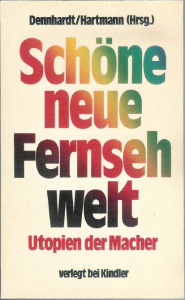 |
Joachim Dennhardt/Daniela Hartmann (ed.)
Schöne neue Fernsehwelt. Utopien der Macher
Kindler, Munich 1984
In 1984 – this books year of publication – we stood at the threshold to a new age of television – the public service broadcasting lost its monopoly. What are the effects of the changes in media policy and the introduction of commercial broadcasters on the programs content? Does more quantity lead to a loss of quality? Or does the journey lead to a “Schöne neue Fernsehwelt” (beautiful new tv world)?
This book sums up the program-makers visions for the future, hope and the claims of back in the days, with articles from: Hans Abich – Alfred Biolek – Peter Boenisch – Heinrich Breloer – Jutta Brückner – Bernd Eichinger – Hans Geert Falkenberg – Werner Filmer – Hanns-Joachim Friedrichs – Thomas Gottschalk – Dieter Hildebrandt – Werner Höfer – Horst Königstein – Hans-Joachim Kulenkampff – Wolfgang Menge – Reinhard Münchenhagen – Günter Rohrbach – Bernd Schiphorst – Dietmar Schönherr Eckart Stein – Dieter Stolte – Helmut Thoma – Heinz Ungureit – Ulrich Wickert – Gunter Witte and others. From today’s perspective it’s interesting to see which hopes were realized and which worries concerning the development of program quality came true.
|
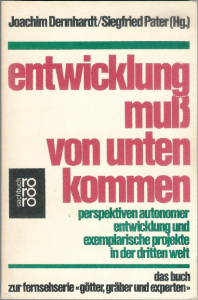 |
Joachim Dennhardt/Siegfried Pater (ed.)
Entwicklung muß von unten kommen. Perspektiven autonomer Entwicklung und exemplarische Projekte in der dritten Welt
Rowohlt, Reinbek 1980
Still, self-righteousness, clichés, prejudices and incomplete information shape our image of the third world. The assessment of development aid isn’t excluded from this bias.
With the former means the gap between poor and rich countries couldn’t be diminished, it has rather increased. The energy crisis and conflicts that could threaten world peace, force us to rethink our relationship with so-called developing countries. That’s why it’s important to depict the various causes of underdevelopment and question how our wealth and the hunger, social hardship and loss of future in the third world are connected. Knowing those correlations between the first and third world, the authors of this volumes tried to find development projects, which
- start at the bottom,
- let the “affected people” become active to find a way out of misery and exploitation,
- are based on the cultural and social traditions of the respective country and which are not subject to Western standards,
- aim at the independence of colonizing interests of the first world.
These simple but effective counterexamples to large-scale development projects whose meaning is controversial in many ways, try to show the possibilities of useful development aid. This volume contains tools for the most important developmental “problem areas” which the projects described are assigned: References to further materials, movies, addresses and definitions.This volume was published as a companion to the developmental television series „Götter, Gräber und Experten“.
|
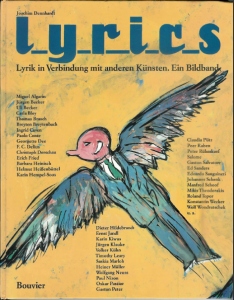 |
Joachim Dennhardt
lyrics. Lyrik in Verbindung mit anderen Künsten. Ein Bildband
Bouvier, Bonn 1989
One thing’s for sure: a poem is usually shorter than a play or a novel. For this reason it is also more entertaining, at least as far as the duration of preoccupation with it is concerned. What is a poem otherwise? Is it the ornately rhymed or the unruly unrhymed?
First and foremost, what is a good poem? What elevates it to a rank to be represented in grave anthologies, what leaves it to wither unnoticed in the desk drawer?
Answering these questions is, of course, left to the reader. This poetic illustrated book aims at giving sensual pleasure and avoiding artistically valuable yawns. It combines famous and dubious rhymes, dedicated and crazy, profound and obscene, rhymed and unrhymed. Whereat the poetry must not be interpreted too seriously.
The illustrated book lyrics is based on the tv series with the same title which was aired from 1984 to 1992 at WDR.
The programs from the Spiegelzelt “Het Danspalais” conveyed texts into new connections with other forms of art like music, performance, choreography, visual and video art.
The book follows in its thematic organization the focus of the respective programs und shows a selection of the involved artists. Next to texts and pictures it shows other materials that developed during working on it, it features anecdotes and conversations. And it shows the face hidden in the anthology behind the poem that it has produced.
|
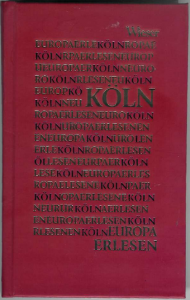
|
Joachim Dennhardt (Hg.)
Europa erlesen: Köln
Wieser-Verlag, Klagenfurt 2005
The series “Europa erlesen” invites you to literary explorations in different regions.
This volume is dedicated to the history, art, music and Rhenish cheerful mentality of Cologne, discussed in many texts from Apollinaire to Böll, Casanova, Heine, from Nietzsche to Petrarca. In addition to that many contemporary authors shared their love for this city in texts that were written solely for this volume.
|
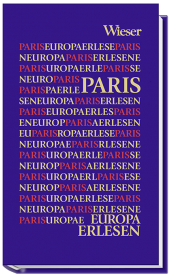 |
Joachim Dennhardt (Hg.)
Europa erlesen: Paris
Wieser-Verlag, 2015
A declaration of love to Paris penned by different authors – they report about their favourite sports, brazen streets, about musicians, dancers and painters. They picture the wild life of the bohemian society at Montmartre and tell stories commencing in the city of love and eternal youth.
Kritik zu Joachim Dennhardts letztem Buch über Paris
aus der Reihe Europa erlesen:
Paris! Jetzt!
Eine geistreiche Anthologie über die Stadt der Städte
Von Klaus Hübner
Dass der Verleger Lojze Wieser auf seine Buchreihe Europa erlesen stolz ist, kann man verstehen. Gut 200 schön aufgemachte, handliche Bücher sind in den letzten beiden Jahrzehnten erschienen, und sie erschließen dem willigen Leser den Kontinent – von Albanien bis Zürich. Unlängst ist ein Band über die Stadt der Städte dazugekommen. „We’ll always have Paris“, möchte man mit Humphrey Bogart sagen, und nach den Terroranschlägen vom 13. November 2015 hinzufügen: „Gerade jetzt!“. Fast jeder, der schon einmal dort gewesen ist, glaubt ja, die Stadt an der Seine zu kennen. Nach der Lektüre dieser Anthologie muss man das Wörtchen „glaubt“ betonen. Denn sie versammelt doch eine ganze Menge von Texten, die auch dem Paris-Kenner Neues zu bieten haben.
Anthologien sind immer ein gefundenes Fressen für Kritiker. An nichts anderem kann man so schön herumnörgeln: Warum ist der drin und jener nicht? Zu wenig Frauen! Und weshalb kriegt diese Autorin fünf Seiten und die nur zwei? Wieso sind auch sehr bekannte Texte enthalten und nicht ganz andere? Für solches Herumnörgeln eignet sich natürlich auch Paris ganz ausgezeichnet. Aber lassen wir das und halten lieber fest, dass der Herausgeber das Flair der französischen Hauptstadt durch seine kluge und anregende Zusammenstellung auf’s Interessanteste zu veranschaulichen vermag. Paris erscheint hier weniger als unübersehbare Mega-Metropole der Moderne, sondern, ohne Verklärung und Kitsch, als ein heute noch inspirierender Ort der Künste, als Ort aufregender Literatur, Malerei, Bildhauerei und Musik. Von François Villon bis Peter Handke versammelt das Bändchen mehr als 50 reizvolle Paris-Texte. Diderot und Voltaire, Victor Hugo, Charles Baudelaire, Guillaume Apollinaire, Julien Green, Paul Valéry oder Heinrich Heine – das konnte man natürlich erwarten. Anaïs Nin und Henry Miller waren nicht zu umgehen, Ernest Hemingway auch nicht. Rainer Maria Rilke, Oskar Panizza, Harry Graf Kessler, Walter Mehring, Alfred Polgar, Kurt Tucholsky, Stefan Zweig, Paul Celan, Rose Ausländer, Georg Stefan Troller, Paul Nizon, H.C. Artmann und Wolf Wondratschek vertreten die deutschsprachige Literatur, und das Gedicht Kaminfeuer in Paris von Wolf Biermann wurde ebenfalls aufgenommen. Gertrude Stein oder Simone de Beauvoir dürfen nicht fehlen, und sogar der alte Goethe ist dabei, der die Stadt bekanntlich nie mit eigenen Augen gesehen hat. Das einstige Montmartre-Viertel mit seinen Künstlern und Dirnen wird ähnlich lebendig wie die revolutionäre Besetzung des Odéon-Theaters im Mai 1968, und selbstverständlich kommt die Liebe nicht zu kurz und der Tod auch nicht. „Solang Paris bestehen bleibt, wird es mir nicht an einem Zufluchtsort fehlen, wo ich meinen Geist aushauchen kann – dergestalt, dass ich keinem anderen nachtraure“, schrieb Michel de Montaigne. Darüber darf man auch heute noch nachdenken.
http://literaturkritik.de/id/22511
|





